The Official Poker Rules

Poker is a card game in which players wager money on the strength of their hand. Different games have different rules, but all involve betting and a showdown in which the player with the best five-card hand wins the pot. In addition to the basic rules of poker, there are a number of strategies that can help players win. These include reading opponents, bluffing and playing smartly. Strong strategy is essential, but luck can also bolster or derail even the strongest hands.
Each player starts the round with two private cards that belong only to them, called hole cards. These are then combined with a set of community cards that are dealt face up to form the board. The objective is to make the best five-card poker hand using a combination of these cards and the player’s private holes.
After a single round of betting, players with holdings that can make a winning hand reveal their cards and a winner is determined. Players may call, raise or fold their cards. In most cases, a player must match the highest previous bet to continue in the hand. The exception to this is if a player has a made a nut hand, in which case the player can raise a maximum of four times the amount of the previous bet or more.
Unlike many other card games, in which suits are valued differently, in poker the rank of the cards matters. The ranking of a card begins with the lowest, which is the deuce and ends with the ace. Cards of the same rank beat each other and pairs (two cards of the same rank) beat high cards. The highest pair is a pair of aces. If two or more players have the same pair, the kicker card determines the winner.
In addition to knowing the rank of your own hand, you must understand how the other players are playing. Observing experienced players and imagining how you would react in similar situations can help you develop quick instincts. The more you play, the faster and better your instincts will become.
Another important rule is that a verbally declared action is binding. If a player announces that they will call or raise, other players are held to this action. Similarly, if a player knocks on the table, this is a pass.
After a big win, it’s important to celebrate politely. Remember that someone else lost when you won, and excessive celebrations can lead to bad feelings at the table. In some cases, floor staff will penalize players for celebrating excessively. Moreover, the louder you shout after a win, the more likely other players will assume that you have a weak hand and will call your bets. This will cause your opponent to lose valuable chips that could have made them a winner. In the end, a good poker hand depends on the strengths of the players’ understanding and ability to predict their opponent’s behavior.